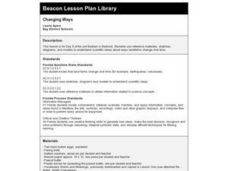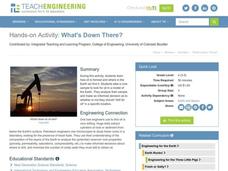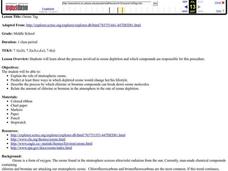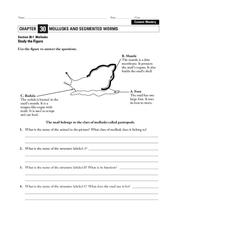Curated OER
Changing Ways
Third graders examine hard boiled eggs as possible models for the earth's layers.
Curated OER
What's down there?
students analyze how oil is formed and where in the Earth we find it. Students take a core sample to look for oil in a model of the Earth. They analyze their sample and make an informed decision as to whether or not they should "drill...
Curated OER
Understanding the Ozone Hole PowerPoint Follow Sheet
In this ozone worksheet, students fill in the blanks to sentences while following a PowerPoint presentation on the ozone layer, its depletion, the causes of the depletion and its structure.
Curated OER
Geologic Timelines
Students view geologic time lines and discuss how old the Earth and solar system is, when dinosaurs roamed Earth, and when humans first appeared. They review the four major eons and life that was present in each before creating a time...
Curated OER
Science: Draining the Land - the Mississippi River
Students use topographic maps to identify parts of rivers. In addition, they discover gradient and predict changes in the channels caused by variations in water flow. Other activities include sketching a river model with a new channel...
Curated OER
Ozone and Temperature Data Analysis, South Pole Antarctica
Students discuss the layers of the atmosphere, and the history of the ozone hole. They discuss the chemistry of the ozone formation. Students compare seasonal data collected with ozonesondes. They compare Antarctic and Arctic ozone hole...
Curated OER
Rocks, Minerals, and Erosion
Students identify and describe rocks that contain records of the earth's history and explain how they were formed. They formulate questions about and identify needs and problems related to objects and events in the environment, and...
Curated OER
Exploring Plate Tectonics
In this plate tectonics worksheet, students answer questions about plate movement, the types of boundaries, the history of Earth's crusts and plate tectonics. They use an on line source to get their answers.
Curated OER
Aquifers and Groundwater
Students understand the purpose of an aquifer. For this aquifer and groundwater lesson, students build a model aquifer find its relationship to water usage. Students record observations as they build the layers of the aquifer.
Curated OER
The Atmosphere Then and Now
Students recall details about the formation of the earth and early atmosphere. They name the layers of the atmosphere and compare amounts of atmospheric nitrogen, oxygen, and argon. Formulate questions about global warming.
Curated OER
Science Word Search
In this science learning exercise, middle schoolers look for the words that are related to the theme of the sheet in the word search. They also work on spelling skills.
Curated OER
Coal: More Than Meets the Eye!
Students participate in a hands-on simulation to help them explain that coal resources are deposited unevenly between the earth's surface and under the ground.
Curated OER
Natural Vegetation
In this earth science worksheet, students identify and locate various vocabulary terms related to natural vegetation. There are 21 earth science terms located in the word search.
Curated OER
Earth's Atmosphere
In this atmosphere worksheet, students will fill in information about each of the earth's atmospheric layers, including the troposphere, stratosphere, and mesosphere.
Curated OER
Do Some Research: Science 1
In this science research worksheet, students read the sentence and use a library or the Internet to find the answer and write it on the blue line. Students must then write a report about this topic: what is the layer of air that...
Science Matters
Earthquake Waves: Wave Notes
A multi-part lesson plan opens with a review of p waves and s waves. Then scholars use a simple s wave simulator to view the way the wave travels. Next, pupils use cups and various fluids to simulate p waves moving through different...
Curated OER
Ozone Tag
Seventh graders explain the role of stratospheric ozone and predict at least three ways in which depleted ozone would change her/his lifestyle. They then describe the process by which chlorine or bromine compounds can break down ozone...
Curated OER
Geologic Age
Students investigate rocks. In this geologic age lesson, students conduct an experiment to determine absolute age as one would for rock layers. Students graph data and problem solve using results.
Curated OER
Convection in a Pan
Learners explore convection. In this lesson on heat and energy, students investigate how heat moves in convection currents. They use their finding to better understand how convection currents effect the movement of tectonic plates.
Project SMART
Rocks and Minerals: Touch the Earth
Students complete a unit of lessons on rocks and minerals. They conduct research, write e-mail questions to geologists, write daily journal entries, label maps demonstrating types of rocks/minerals found, and create a web page that...
Curated OER
Mollusks
In this mollusks worksheet, high schoolers use an illustration of a snail to complete 4 short answer questions about the structure and function of the parts of gastropods.
Curated OER
Candy Quakes
Eighth graders use candy to show the effects of deformation forces on the earth's crust. In this rock and fossil formation instructional activity students construct models and simulations to describe and explain natural phenomena.
Curated OER
Interior of the Earth
Sixth graders identify and describe the composition and physical properties of the layers of the Earth. They also explain how scientists used the scientific process to know about the center of the Earth. Finally, 6th graders read a...
Curated OER
Oil Trap Model
Students investigate oil accumulation by creating a model in their classroom. In this petroleum geology lesson, students discuss where oil comes from and why it is vital to our society at this particular time. Students cut out a 3-D...
























